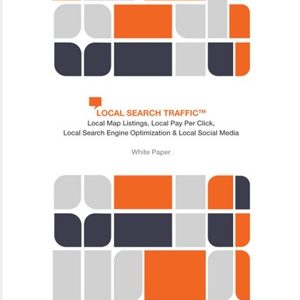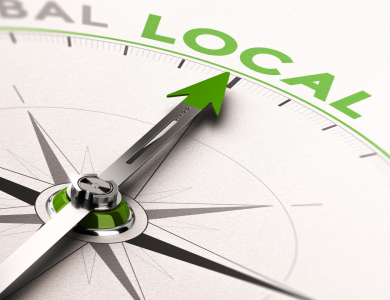
Anyone who owns a business today understands the crucial role search engines play in their success. This significance becomes even more pronounced for local businesses. Consider this statistic:
Not only do consumers search for local information, but they also convert more through local searches compared to non-local ones:
If local searches are 157% more effective in leading to a purchase compared to regular, non-local searches, it’s time to give local search the focus it demands.
Local Search Optimization 101
Local search is a specialized field. A lot of details need to be covered – from ensuring consistent NAP (Name, Address, Phone number) details of the business to injecting local elements into the meta data for local pages, to understanding the critical role user reviews play in both rankings and clicks.
Citations and Business Pages
Getting your business listed on local business pages like Google My Business, Yahoo Local, Bing Places for Business, Yelp, and local directories is often the first step toward building a local search footprint. Managing the data listed about your business on each site, ensuring the consistency of the citations you receive from each site, and focusing on the right websites to earn citations from are all crucial contributors to local search rankings.
User Reviews
Local search typically revolves around service-based businesses where the quality of service is often the deciding factor between success and failure. Reviews feature prominently across organic results as well as the 7-Pack and carousel listings on Google’s SERPs.
Incentivizing customers to leave reviews on Google+ Local, Yelp, TripAdvisor, and similar review sites provides an immediate stamp of authority to your business pages.
Localizing On-Page SEO Elements
On-page SEO elements play a crucial role in local search as well. Infuse your on-page ranking factors with local keywords and local information such as city and state names. Local data in critical on-page elements like the page title, H1 tags, title tags, meta descriptions, and page URL send direct signals to Google regarding the relevance of your page for local searches.
While creating dedicated local pages for each city your business operates in is essential, removing duplicate pages from your website and using the rel=canonical link element judiciously also contribute to a better local rank.
Images
Images play a huge role in determining whether you appear on the carousel or not.
Images on your local pages must not only be of excellent quality but also be optimized for local search with local content in their ALT tag descriptions. Large, relevant, and eye-catching images accompanied by a detailed description of your business go a long way.
Other Factors
While the factors listed above are crucial, there are additional local SEO signals your business should maximize.
These include maintaining local flavor on your social media platforms and content marketing, keeping your local content across the web fresh and relevant, ensuring accurate location tags on your business listings, maintaining site speed, and ensuring your website is mobile-optimized.
The last factor – mobile optimization – although not a directly stated ranking signal, is essential. According to Comscore data, 79% of mobile users perform local searches. Hence, having a mobile-optimized website is a prerequisite for ranking well and getting conversions.
Topping Local Searches in Competitive Post-Pigeon Markets
2014 saw local search take center stage with Google’s Pigeon update, which significantly impacted both local and national brands.
Pigeon’s primary purpose was to integrate local search signals more closely with Google’s broader web search signals to provide users with more relevant results. It also addressed fundamental issues with local search, such as enhancing the visibility of local directories, fixing the Yelp issue in local searches, and removing duplicate entries from organic and 7-Pack results.
With the changes brought by Pigeon, there’s a renewed scramble for the top spot in local listings, especially in critical service sectors. So, what should you focus on to fend off the competition and rise to the top? Here’s a countdown of the top 10 local search signals that will give your business an edge in a hyper-competitive local search market.
#10. Quality of Unstructured Citations
Unstructured citations refer to mentions of your business – name, city, and/or description – in content that does not follow a typical directory format, such as articles, blogs, and other forms of content across the web.
Pro-tip: Enhance your content marketing by including local content wherever relevant. Work on getting your business name mentioned alongside your target city as naturally as possible. The more authoritative the publisher, the better the impact on your local rankings.
#9. Quantity of Google Maps Reviews
User reviews are a key ranking signal. Multiple studies have shown users trust word of mouth and recommendations from other real users more than ads or brand-sponsored content. When it comes to judging a business’s worth, users (and Google) follow the “more is merrier” rule.
Pro-tip: Actively seek out user reviews from your existing and past customers by reminding them to leave a review through multiple channels. A simple, gracious request via an email or thank you page usually does the trick. It’s also a good idea to put up posters or signage inside stores describing your existing reviews and encouraging users to add their views. However, do not offer monetary or other incentives in exchange for reviews, as most review sites, including Yelp and Google+, frown upon such practices.
Spend dedicated time and resources monitoring spontaneous reviews across various review sites and managing your online reputation effectively.
#8. Physical Address in City of Search
If you’re searching for a Mexican restaurant in Boston, a result showing Mexican restaurants in Los Angeles isn’t helpful. Research indicates that the average consumer is willing to travel 17 minutes to reach a local business. Hence, the physical proximity of your business to the searcher’s location gives you an edge over businesses that are geographically further away.
Pro-tip: Ensure your citation data includes your complete address wherever possible. Offer discounts or other incentives to users for checking in on platforms like Foursquare, Yelp, or Facebook to boost your visibility. However, refrain from listing your business in nearby cities or towns where it’s not actually located, as this can result in penalties from Google and damage your local SEO efforts.
#7. City, State in Landing Page Title
The importance of a precise address match becomes even more technical at this level. It’s essential to publish your address, city, and state across business pages and directories on the web, but it’s even more crucial to have your own website display these details clearly to rank high in local searches.
Pro-tip: Pay close attention to your on-page ranking elements for local SEO. Include your city and state in your landing page title, H1 tag, title tag, meta description, and landing page URL. If your business operates in multiple cities, create dedicated landing pages for each city with content crafted specifically for your target market. Avoid copying content and just replacing the city names, as this can be counted as duplicate content by Google and result in penalties.
#6. Quality of Inbound Links to Landing Page URL
This factor gains importance in the post-Pigeon context. Low-quality inbound links refer to links from typically PR n/a or PR 0 sites that are labelled spammy by Google, with explicit warnings to users against visiting them.
Pro-tip: Weed out low-quality, low-authority sites from your local link profile. Disavow such links using Google’s Disavow Tool or third-party tools like Rmoov, which can help you analyze and manage your link profile. Alternatively, you can contact the webmaster of the offending website and request the removal of the inbound link.
#5. Proper Category Associations
Google My Business pages allow business owners to list their businesses in specific categories to facilitate quick information retrieval during local searches. According to Google, you should choose categories for your business based on what type of business you have, not based on the products and services you offer.
Pro-tip: Besides the three basic categories of ‘Storefront’, ‘Service’ and ‘Brand’, Google allows you to list up to five sub-categories to make your listing as targeted as possible. While adding custom categories is no longer possible, you can try various combinations of ‘what your business is about’ to fill all five category options.
#4. Quality of Structured Citations
Citations from high-authority sites form the backbone of local SEO. The source of your citations is crucial for ranking high in competitive local searches. This point refers to two aspects: the citation itself should be high quality, and the website offering the citation should be an authoritative one.
Pro-tip: Ensure your citation includes the basic NAP details correctly. A good description of your business with your city name and keywords helps Google locate you better. High-quality images accompanying your citation help your case and can land you a carousel position. Besides the obvious Google My Business Page, aim to build detailed, structured citations on high-authority sites to stay ahead of the competition.
#3. Quality of Inbound Links to Domain
While factor #6 dealt with inbound links to the specific local landing page, this factor refers to the quality of inbound links to your domain overall. Just as an Ivy Leaguer mingles with other Ivy Leaguers, a reputable website attracts links from other strong domains, collectively boosting the search rankings of the recipient site.
Pro-tip: Focus on developing high-quality inbound links with local anchor text through your content marketing efforts. Mention your business within the right context by high-authority sites to improve your local rankings.
#2. Consistency of Structured Citations
Structured citations provide search engines with precise data about your business. Business directories and yellow pages with clear NAP details, categories, reviews, descriptions, and images now get priority in Google’s local search rankings post-Pigeon. The key here is to ensure you follow the same format and offer the same details to all directory sites to avoid confusing search bots and end-users.
Pro-tip: Given the importance of consistent data in your structured citations, consider investing in local SEO tools to help you put up (or fix) structured citations across hundreds of directories, monitor their content, and manage them. Invest time in drafting unique citations for each location you operate in.
#1. Domain Authority of Website
The single most important factor in a competitive market is the strength of your domain. The trust a user and search engine places in your brand and domain name reflects in achieving top search rankings, including placements inside the 7-Pack or carousel for your keyword + city combination.
Pro-tip: Post-Pigeon, digital marketers need to adopt a top-down approach to local search rankings. Work towards building a website that is respected and well-regarded in your industry. Develop a solid link profile with high-authority sites linking back to you with the right keywords and anchor text. Focus on building an easily recognizable brand. The efforts may seem significant now, but the payoffs are even more substantial!
Image Credits
Featured Image: Created by author
Image #1 and #2: Created by author
All screenshots taken December 2014



